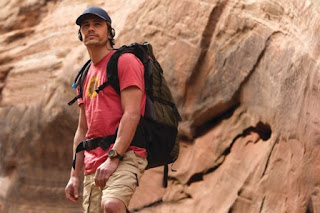“Slumdog Millionaire”, showered with numerous awards, appreciated by eight Oscars (including those for best picture, screenplay, director, music, film editing and pictures) dissappointed me. Indeed, from a technical point of view much cannot be criticised, Danny Boyle reveals his storytelling ability and exceptional control over its form, and also shows his... market knowledge. I don't know how it was possible that a formal masterpiece lacking substance like “Slumdog Millionaire” convinced critics, in the meantime sweeping all awards from right under the political genre bomb that Ron Howard's “Frost/Nixon” was. Boyle enchanted people around the globe and was able to create an additional artificial Hollywood-Bollywood ideology to the story of Cinderella. Another movie, courtesy of the English director – 127 hours – consists of many elements that comprises “Slumdog Millionaire”, however, fortunately it varies hugely in its substance layer.
“127 hours” begins a story about freedom told with the language of popculture. We meet the character – Aron Ralston (James Franco) – who, in search of a surge of adrenaline and wanting to endure a sense of freedom, travels around the canyon in solitude with a camera, bike and backpack with essentials. Like he himselfs states – the canyon is his second home. By running, playing around, jumping from rock to rock he shows off his physical abilities. The camera lens is always directed at his face – he enjoys watching his own reflection. And after millions of confident, faultless stunts he fails only once. Almost instantly he becomes a prisoner of a gigantic boulder, which crushes his upper arm. At that moment something reaches its demise; the epic locations, the soothing sound of music – somewhere along the line the freedom manifestation becomes suppressed. The movie's title appears and the cramped drama of one actor commences.
From capturing a graced by sunlight canyon to an imprisoned between boulders arm – Boyle supplies the audience with a visual rollercoaster. The popcultural imagination of freedom (wind blowing through one's hair, wide plains in the sunlight, soothing music) contrasts with a tight rocky gap. He ponders upon freedom and humility. Aron Ralston is confident that he's a free man. His excursions away from the city, the breaking away from family and friends were supposed to be a sign of independence from the world and the “system”. Jumping from rock to rock the main character felt like a king of the hill, putting his manly pride and egotism at rest, humbling nature while simultaneously integrating with her. He thought that nature plays a part in the process of him breaking free from the global village's chains; that thanks to it he can be someone exceptional, gain a real, unique personality. And all of this was supposed to render him as someone great, atleast in his eyes.
Boyle confronts Aron's imaginations with nature; a nature so adament and neutral. With the fall of a boulder that crashes the character's arm, a changing process occurs, an alteration commences. On our very eyes the director presents a clash between the character's thoughts and the truth – reality. Desiring and longing for something to drink, he thinks of pictures from commercials. Reminiscing about past mistakes, he presents them in the form of a television drama. It turns out that he's a slave of globalism just like everybody else. Was he really free? Did he know what freedom actually was?
With time, Aron begins to understand his past mistakes. In this boulder he sees some kind of divine message, one that could change his attitude towards the world surrounding him, one that was supposed to be a chance for a different future by mending the mistakes of his past youth. And when the last of the 127 hours end, Aron is a totally different person.
“127 hours” didn't have to be a success. Its plot was thought to be boring and not movie material. Fortunately, Danny Boyle shows an unbelievable director's craft, a talent for interesting storytelling, exceptional cooperation with the actors, and experts responsible for visual effects. The pictures are great – courtesy of Anthony Dod Mantle (awarded for “Slumdog Millionaire” and with an OBF award) and Enrique Chediak – which were merged into a quick and creative film edit by Jon Harris. The art direction presents the canyon very well with A. R. Rahman's music wonderfully complementing it. Also, a vital aspect of the movie are spectacular music singles such as Dido's “If I rise” and Sigur Ros' “Festival”. Especially the latter sounds beautiful and just, and proves to be a wise choice of melody for the movie finale. However, it seems that James Franco hugely contributed to the final success of “127 hours”, giving life to an unbelievably mature and emotional character. At times the camera focuses the audiences' complete attention on him. It is then that Franco shows off his theatrical abilities.
Danny Boyle had a vision for this motion picture. He supplies a true feast for the eye, simultaneously reaching for quite a universal subject. At times he's able to shock us, sometimes he manages to cheer us up. “127 hours” is a beautiful film, hugely hypnotising and emotional. It is a masterpiece – a masterpiece so mature, so complete.



